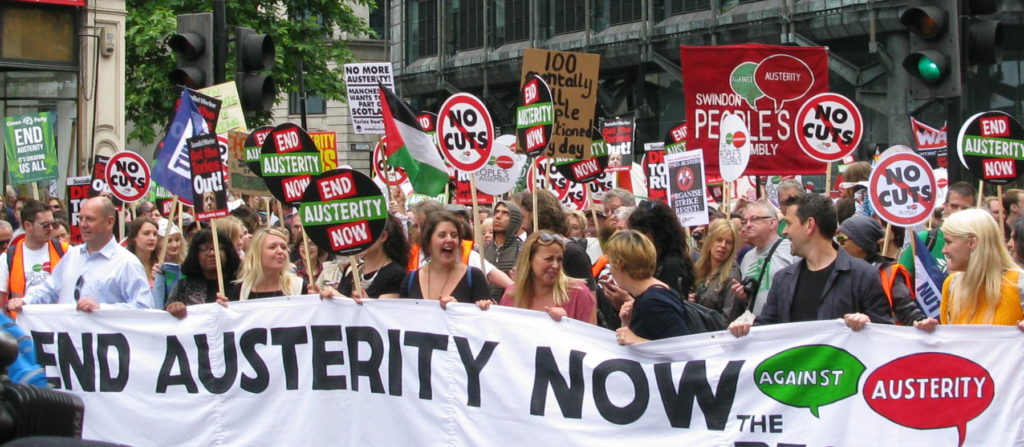Bond markets boom – time to borrow
In both the USA, and the UK, investors are rushing into government bonds. Scared by the turbulent stock market, those with money are desperate to lend money to governments rather than risk buying shares. And so, only a few days after the American government had its credit rating downgraded, its ten year bonds now have a yield of less than 2% – its lowest ever rate. In other words, it is cheaper for the US Treasury to borrow than it has ever been.
In the UK, Government borrowing isn’t quite the cheapest it’s ever been. But they are getting the best rate on their 10 year gilt since the 1890s: only paying out around 2.24%. So it’s the cheapest in, well, quite a while.
We shouldn’t be surprised about this – as I wrote here after the downgrading, this was always quite likely. Similarly, borrowing has in general been very cheap throughout the downturn. But it does say something important. People who have money aren’t investing in anything productive. They want safer bets, and so they are putting it in things which are lower risks. Other places receiving investment are gold, and currencies like the Australian dollar (Australia had a stimulous package rather than cutting (so far), so its economy isn’t screwed).
Neither gold nor currency speculation do anything productive – they don’t deliver new activities that anyone finds useful, and they certainly don’t create new jobs. And so there’s a real risk to the economy – if no one invests in productive activity, then we risk a downward spiral.
Now, there is one way out of that spiral. And let’s talk in the language of the right for a minute. If it becomes cheaper for the government to borrow, that’s because demand for bonds has gone up: the number of people wanting to keep their money in Treasury bonds is high. The way out of the death spiral is for the government to let them lend this money. The state then takes the risk of investments in productive activities off individuals, and spends the money into the economy – investing it in the productive activities that can’t get money from risk-shy private investors. This makes sense because the risk to individuals if investing in a given activity may be high, but the risk to the state if everyone stops investing is higher.
Of course, I would rather they didn’t just lend willy nilly to corporations whose main business is trashing our planet and people’s lives. I would much rather that they use the money to buy up those big companies and then co-operativise them, to invest in renewable energy, and to invest in people through education and other public services. But even if all we want to do is keep our capitalist economy afloat, then it is vital that the government listens to the market, accepts the money it wants to lend them, and then re-invests that in productive activities creating jobs, rather than allowing that money to instead be used to buy up gold – which doesn’t do anyone any good.
Investors are looking for safe havens. They are not financing activities which will help us out of our economic crash. They want instead to lend money to governments. UK & US governments can therefore borrow at only around 2%. So long as the government’s investments yield a higher return (compared not with now, but with the death spiral of them not investing) then we make money. In the US and the UK, the government has a chance to prevent a death spiral. But they must forget their bizarre deficit fetishism, and borrow, and spend to build a new, better economy.



Adam –
Even if we assume that you are right (which you aren’t) and the point of QE is simply a massive increase in base money, you would still need to manufacture a situation in which it was more profitable for that money to go to companies than for it to go into “safe haven” Government debt. That’s why the Bank is extending the money to banks via the buy-back of bonds, rather than simply issuing more bonds – because it simultaneously raises their price (not their yields! That’s lowered!).
Valmont – er, no. I didn’t say that I hope banks will lend to the government rather than companies. I said that that’s what they’ll do whether we like it or not.
Also, that isn’t the whole point of QE. The point of QE is to give money to financial institutions in the hope they will lend to companies, not to artificially rase the interest rate on bonds (though that could potentially be a result, depending on what else is happening in the market.
And your notion that private companies are better than nationalised ones at choosing where to invest strugles a little when you look at the nationalised banks of SE Asia and the private ones of the west and their relative success in recent years. I think you’re goung to struggle somewhat to arhue the corner of the private sector.
Low bond yields have been a Government target since quantitative easing began a few years ago.
As Ramsay rightly points out, it’s better for a bank to put cash in a “safe haven” paying out even just 2% than to have it sitting there doing nothing. However, the point of the entire QE programme has been to raise the prices of Government bonds, lowering their yields and thereby – hopefully – making it less profitable for banks to invest in bonds than it would be for the banks to lend money to businesses (assuming the margins on a commercial loan would be bigger than 2%, not a long shot given the BoE base rate).
But wait, the Bank of Ramsay is now suggesting the Government reverse this entire policy. Banks should use the money the Government gave them in exchange for bonds to buy back more bonds, more cheaply, and pocket the interest. Instead of banks lending directly to businesses of any size, or even individuals, they should just lend to the Government so it can best decide how to spend the cash.
The best part was the suggestion that banks lend ‘willy nilly’. Apart from the fact that bank loans are at historic lows *even after* QE, the suggestion that the Government will lend more sensibly is ludicrous.
Thanks Daniel,
On your first point, I’m afraid I don’t agree. It’s the difference between a regular investor and what is sometimes called a universal investor. For any individual, it makes sense to flee to safety – gilts, gold, etc. It is only if you have a significant and broad stake in the economy as a whole that it is worth investing in the economy as a whole. Even if companies act rationally, it is in the rational self interest of companies individually to flee to safety. But the state is dependent on productive activity across the economy to deliver its revenue, so it has a different set of sums.
Put it another way: investors don’t think governments will go bust. So they lend to governments at low interest rates (around 2% at the moment). Therefore for a return on investment to be worthwhile for the government, it only has to deliver more than 2% compared to not making any investment with that money (ie having it invested in gold/currency). For an individual investor, it has to have a return higher than that (ie higher than the rate they borrow at) and compared with a different base (ie they don’t compare it with the overall cost to the country of the economy collapsing, just with the return on other things – gold, currency speculation, etc).
On your second point, yes, if we borrowed more that might lead to borrowing becoming more expensive (though it’s much more complex than that). So the question is this: is the return on investment for the state greater than the 2% interest rate? If the cost of not borrowing and spending now is an economic collapse, then it’s much cheaper to borrow. We’ve already seen this: in the quarter to June 2011, we borrowed more than in the quarter to June 2010: the cuts had undermined the economy, tax revenues were lower, and this cost was higher than the ‘savings’ from cutting. So by borrowing now, we can end up borrowing less in the long run.
I am not sure it is that simple. For a start, the government is supposed to be representative of the people (cue unrelated arguement); if the collective will of the people is “we do not want to take risk at the moment” then our government should not be taking that risk *against our wishes*.
Of course, if the risk of not investing in productive industry is greater than doing so, it makes sense to take the smaller risk rather than the larger risk. Make the market aware of this (government does not actually need to do anything – markets will work it out for themselves quick enough) and they’re investment choices will shift.
Also, if goverment did start borrowing and spending again (this model has been tried before), then the markets would react to the increasing risk of government bonds by increasing the yields.
On a smaller scale, loan companies always offer the best loan rates to those who don’t actually need to borrow and as soon as those cheap credit offers are taken up the rates go up to reflect the increasing indebtedness and consequential higher risk.
I strongly believe the current UK government is cutting too much, too quickly and too ideologically. However, they are right that running an annual deficit in excess of annual growth is not sustainable long-term.